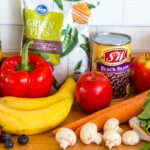Experiencing excessive gas can be uncomfortable and embarrassing. While everyone produces gas as a natural part of digestion, certain foods and digestive habits can lead to increased gas production. Understanding which foods are common culprits can help you manage your symptoms and enjoy a more comfortable digestive experience.
Understanding the Causes of Excessive Gas
Excessive gas can stem from two primary sources: swallowing air and the fermentation of undigested food in the colon. Swallowing air, often referred to as aerophagia, can be exacerbated by habits like eating too quickly, chewing gum, smoking, or wearing loose-fitting dentures. However, the more significant contributor is often the consumption of specific foods that are difficult for the body to break down completely. When these undigested food particles reach the colon, they become food for bacteria, which produce gas as a byproduct.
Common Foods That Cause Excessive Gas
The following list includes foods known to commonly contribute to increased gas production. Keep in mind that individual tolerance varies, and what causes gas in one person may not affect another in the same way.
1. Beans and Lentils
Beans and lentils are notorious gas producers due to their high content of raffinose, a complex sugar that the human body struggles to digest fully. This undigested raffinose is then fermented by bacteria in the colon, leading to gas.
2. Cruciferous Vegetables
Vegetables such as cabbage, broccoli, cauliflower, bok choy, and Brussels sprouts belong to the cruciferous family. These vegetables contain glucosinolates, sulfur-containing compounds that can contribute to gas production during digestion.
3. High-Fiber Foods (Bran)
While fiber is generally beneficial for digestive health, a sudden increase in fiber intake, especially from bran, can lead to increased gas. The bacteria in the colon break down the fiber, producing gas as a result.
4. Dairy Products Containing Lactose
Lactose, the sugar found in dairy products, can be problematic for individuals with lactose intolerance. When lactose is not properly digested due to a deficiency in the enzyme lactase, it ferments in the colon, causing gas, bloating, and other digestive discomforts.
5. Fructose
Fructose, a naturally occurring sugar found in fruits and used as a sweetener in many processed foods and soft drinks, can be difficult for some people to absorb. This malabsorption can lead to fermentation in the colon and subsequent gas production.
6. Sorbitol and Other Sugar Alcohols
Sorbitol, mannitol, and xylitol are sugar alcohols commonly found in sugar-free candies, gums, and artificial sweeteners. These substances are poorly absorbed by the body and can cause gas, bloating, and diarrhea, especially when consumed in large quantities.
7. Carbonated Beverages
Carbonated beverages like soda and beer introduce excess air into the digestive system. This trapped air can lead to belching and bloating. The carbon dioxide in these drinks can also contribute to gas production.
Digestive Disorders and Excessive Gas
While diet is a primary factor, certain digestive disorders can also contribute to excessive gas. If you experience frequent or severe gas accompanied by other symptoms like abdominal pain, changes in bowel habits, or weight loss, it’s essential to consult a doctor to rule out underlying medical conditions such as:
- Irritable Bowel Syndrome (IBS): A common disorder that affects the large intestine, causing abdominal pain, cramping, bloating, gas, and diarrhea or constipation.
- Small Intestinal Bacterial Overgrowth (SIBO): An excessive amount of bacteria in the small intestine, which can lead to increased gas production.
- Celiac Disease: An autoimmune disorder triggered by gluten, which can damage the small intestine and interfere with nutrient absorption, leading to gas and other digestive problems.
- Gastroparesis: A condition where the stomach empties too slowly, leading to food fermentation and gas production.
Managing Excessive Gas: Tips and Strategies
If you are struggling with excessive gas, consider implementing these strategies:
- Keep a Food Diary: Track your food intake and note any correlation between specific foods and your gas symptoms. This can help you identify trigger foods.
- Eat Slowly and Mindfully: Take your time while eating and avoid gulping air. Chew your food thoroughly.
- Limit Carbonated Beverages: Reduce or eliminate your consumption of soda and beer.
- Avoid Gum and Hard Candies: These can cause you to swallow excess air.
- Consider Enzyme Supplements: If you suspect lactose intolerance, try lactase supplements before consuming dairy products.
- Increase Fiber Intake Gradually: Avoid sudden increases in fiber intake. Give your digestive system time to adjust.
- Over-the-Counter Remedies: Activated charcoal or simethicone may help reduce gas and bloating.
- Consult a Healthcare Professional: If your symptoms are severe or persistent, see a doctor to rule out any underlying medical conditions.
Conclusion
Identifying and managing the foods that cause excessive gas is a crucial step toward improving your digestive comfort. By understanding the common culprits and implementing dietary and lifestyle adjustments, you can significantly reduce gas production and enjoy a healthier, happier gut. Remember to consult with a healthcare professional if you have any concerns about your digestive health.
